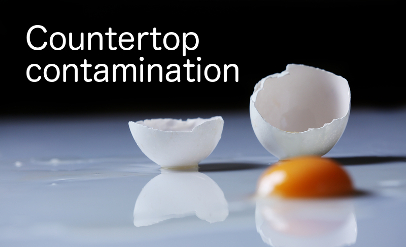With the holiday season hustling and bustling, company and food goes hand in hand. Friends and families gather for dinner and coworkers share treats in offices and factories. Each holiday season, the CDC renews reminders about the importance of food safety basics.
 “Wash hands and surfaces often, avoid cross-contamination, cook foods to proper temperatures and refrigerate foods promptly,” is the mantra from the Centers for Disease Control and Prevention.
“Wash hands and surfaces often, avoid cross-contamination, cook foods to proper temperatures and refrigerate foods promptly,” is the mantra from the Centers for Disease Control and Prevention.
Those rules are particularly important when preparing and serving dishes and drinks made with eggs, which are frequently featured in festive feasts. Children, the elderly, pregnant women and anyone with a compromised immune system, such as transplant recipients and cancer patients are at greater risk of becoming infected by such pathogens.
Eggs are a staple ingredient in cookies, cakes, Chanukah latkes and eggnog. The way eggs and their shells are handled can help or hinder the holidays. The vast majority of eggs that are sold in their shells are not pasteurized, and therefore can contain Salmonella bacteria. Regulations require certain measures for commercially sold eggs that help reduce pathogens on shells. However, Salmonella can live inside the shells.
To avoid holiday hazards, check this list of egg-cellent food safety tips. In fact, check it twice to make doubly sure you don’t poison family or friends.
Think of raw eggs like raw meat: Would you rub meat on your countertops? Would you touch raw chicken and carry on preparing other foods without washing your hands with soap and water? After cracking eggs into a bowl, always wash your hands and anything else you touched. Also watch for drippings on the sides of bowls and countertops, making sure to clean thoroughly clean anything that has come into contact with raw eggs.
Raw eggs make an entire dish raw: Rolling out raw cookie dough on counters and cutting out holiday cookies creates cross contamination possibilities for anything cookie makers or their dough touches. Be sure to closely supervise children and clean up carefully so guests don’t unknowingly touch potentially contaminated surfaces.
Say no to raw dough: Just like eating raw meat or fish, consuming raw cookie dough could make you sick. No matter what farm they come from or what store sells them, all eggs are at risk of containing Salmonella. The CDC warns against eating raw cookie dough because of raw eggs. Raw flour can also contain pathogens such as E. coli and requires similar procedures as eggs to avoid foodborne illnesses. Children, the elderly, and anyone with a compromised immune system are at greater risk of becoming infected by such pathogens.
Pasteurized egg products: Egg products that are sold in cartons are generally pasteurized. Many restaurants use such egg products because of the added safety pasteurization provides. These products also eliminate the possibility of bacteria or other pathogens on shells contaminating foods and food preparation areas. If sauces such as Ceaser dressing or Hollandaise call for raw eggs, using egg products is safer.
 Cook thoroughly: Make sure your no foods are raw or undercooked in the center. Avoid burning the outside of lotkes and getting stuck with raw centers by keeping and eye on the pan’s heat. Steer clear from sunny-side-up eggs with runny yolks.
Cook thoroughly: Make sure your no foods are raw or undercooked in the center. Avoid burning the outside of lotkes and getting stuck with raw centers by keeping and eye on the pan’s heat. Steer clear from sunny-side-up eggs with runny yolks.
Do not drink unpasteurized eggnog: Unpasteurized raw eggs should not be used in eggnog, smoothies, shakes or any other beverages. Don’t believe the myth that spiking the eggnog with alcohol will kill pathogens. That is simply not true, according to public health officials.
Don’t risk poisoning the fun with food borne illnesses. Let your holiday times and treats be treasured fondly.
(To sign up for a free subscription to Food Safety News, click here.)
